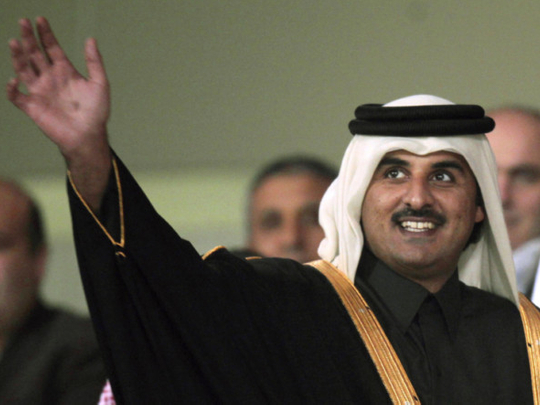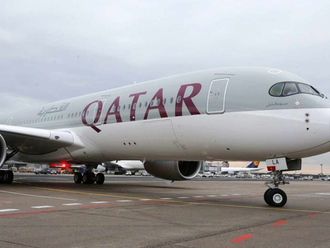
Doha: Qatar’s new Emir Shaikh Tamim Bin Hamad Al Thani is widely expected to push ahead with his father’s drive that transformed the coutry into a regional power broker.
A graduate of Britain’s prestigious Sandhurst military academy, 33-year-old Shaikh Tamim is said to be a warm and affable pragmatist as well as being an avid fan of the Manchester United football club who enjoys playing tennis and other sports.
But while his father Shaikh Hamad Bin Khalifa Al Thani became widely recognised on the world stage in recent years, the personality and ambitions of his son and heir Shaikh Tamim were more of a mystery.
Some analysts have described the new emir as being more conservative in temperament than his 61-year-old father, raising questions about the direction the country will take during his reign.
Yet others say he is a liberal more prone to listening to demands from young Qataris who may wish for political reform, or are worried by the country’s close ties to the United States and its robust support for uprisings in Libya and then in Syria.
“He may have sympathies to some conservative ways of thinking,” said Michael Stephens, researcher at the Royal United Services Institute based in Doha. “But to be a ruler in Qatar, you have to understand that there are conservative forces in the country, and make concessions to them.”
Though little is known about Shaikh Tamim’s inclinations, the fact that he is the son of Qatar’s emir and first lady Shaikha Mouza Bint Nasser Al Missned suggests an interest in continuing their legacy, especially in diplomatic power broking and the promotion of Qatari soft power through the media and sport.
“The most important task ahead of him will be to continue the strong legacy of his father, and he understands that,” Stephens said.
When Shaikh Tamim’s father, Shaikh Hamad replaced his father in 1995, Qatar was a backwater. Now it is often at the forefront of world diplomacy and a state in the midst of enormous domestic transformation as it prepares to host the 2022 football World Cup.
Shaikh Hamad developed Qatar’s massive gas reserves to make it one of the world’s richest countries. He then used that money to promote the emirate.
With close ties to the United States, Qatar hosts a large US military base and has brokered negotiations on conflicts from Afghanistan to Yemen, and from Lebanon to Sudan.
More visible role
Qatar has also helped bankroll rebels who deposed Libya’s erstwhile ruler Muammar Gaddafi and those currently fighting Syrian President Bashar Al Assad.
In recent years, Shaikh Tamim has taken on a more visible role in Qatar’s affairs. In 2011 he hosted his first high-level multinational meeting — of a Libya contact group in Doha. He has also attended border talks with Saudi Arabia.
Shaikh Tamim has also been given a considerable role in overseeing his mother’s flagship project, Education City, a cluster of Western universities with branch campuses in Doha.
Born in 1980, Shaikh Tamim was educated at Sherborne, an exclusive private school in the west of England, and like his father at the Royal Military Academy Sandhurst which as well as training all officers of the British Army has a tradition of graduating both domestic and foreign princes.
As crown prince, Shaikh Tamim was deputy commander-in-chief of the Qatar Armed Forces.
“His world view is quite similar to that of his father,” said a diplomatic source who declined to be identified.
“He is always relaxed, humorous, affable. He’s quite warm.
He is also extremely pragmatic. If there is a problem, he tries to solve it.”
Domestic reform was been his father’s most noticeable weak point, and it is too soon to tell whether Shaikh Tamim will tackle he issue. Parliamentary elections in Qatar have been continually postponed as the ruling family has refused to give up its monopoly on power. Qatar does not have any organised opposition.
“Though most Qataris are happy about Qatar’s new found role and prestige, some question just how much time and money has been spent acquiring it. While he will continue the policies generally, I’d expect some subtle cutbacks here and there,” said another analyst who declined to be named.
“One mustn’t forget that there are some Qataris who, despite their wealth, complain that there are better roads in southern Lebanon than in Doha.”
Shaikh Tamim may also face resistance from conservatives who resent what they perceive to be overly-progressive policies.
“By and large, Qataris are and will continue to be religiously and socially conservative. There may come a point where enough Qataris feel their leadership has gone too far,” the analyst said.










